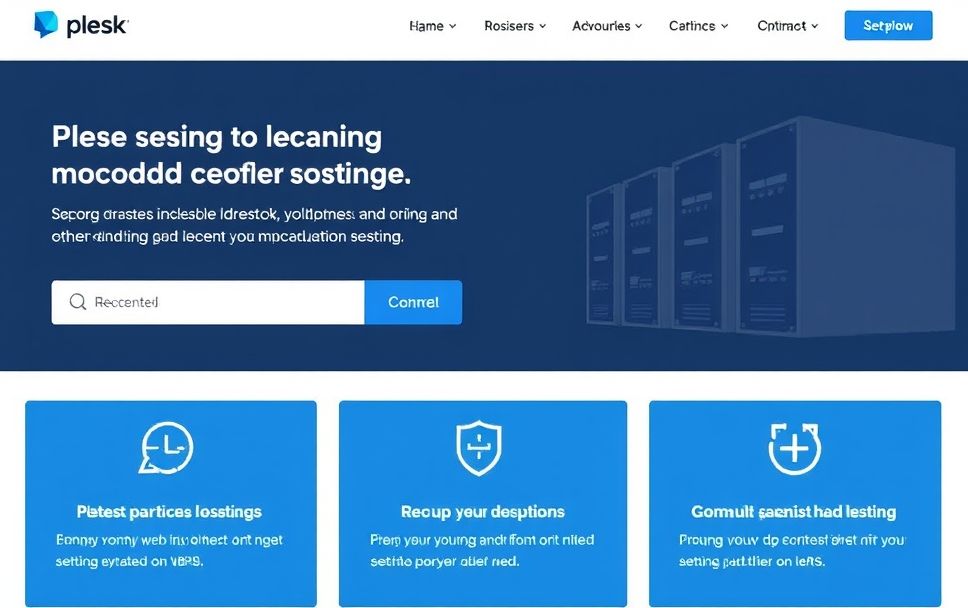Plesk Hosting: The Definitive Glossary
Plesk Hosting refers to a web hosting platform that utilizes Plesk, a powerful control panel designed to manage websites, applications, and servers. This tool is particularly favored by web developers, system administrators, and IT professionals due to its user-friendly interface and robust feature set. Understanding Plesk Hosting is essential for anyone involved in the management of web hosting environments.
Understanding Plesk Hosting
Plesk Hosting simplifies the management of web servers, allowing users to deploy, manage, and host websites effortlessly. It supports various operating systems, including Linux and Windows, making it versatile for different hosting environments. With Plesk, users can manage multiple domains, streamline application installations, and automate server tasks.
Key Features of Plesk Hosting
- User-Friendly Interface: Plesk provides an intuitive dashboard that enables users to manage their hosting environments without extensive technical knowledge.
- Multi-Platform Support: It supports both Windows and Linux environments, making it a flexible choice for diverse applications.
- One-Click Application Installers: Users can easily install popular applications like WordPress, Joomla, and Drupal with just a single click.
- Security Features: Plesk offers integrated security tools, including firewalls, SSL certificates, and automated backups, enhancing the security of hosted applications.
Applications of Plesk Hosting
Plesk Hosting is utilized in various real-world applications, making it an essential tool for developers and administrators. Here are some practical use cases:
1. Web Development and Testing
Web developers often use Plesk Hosting to deploy and test applications in a controlled environment. For instance, a developer might set up a staging server to test new features before pushing them to production, ensuring that updates do not disrupt live websites.
2. E-Commerce Solutions
Businesses running e-commerce sites benefit from Plesk’s ability to manage secure transactions and maintain uptime. A retail company can use Plesk to host its online store, ensuring that their website is always operational and secure for customers.
3. Managed WordPress Hosting
Many hosting providers offer managed WordPress hosting using Plesk. This service allows users to easily manage their WordPress installations, perform updates, and optimize performance without needing in-depth technical knowledge.
4. Server Management for Agencies
Digital agencies managing multiple client websites can leverage Plesk Hosting to centralize their operations. By using Plesk, they can manage all client sites from a single dashboard, streamlining their workflow and improving efficiency.
How to Use Plesk Hosting Effectively
Utilizing Plesk Hosting effectively involves understanding its features and how to leverage them for optimal performance. Here are some practical steps:
- Set Up Domains: Start by adding your domains through the Plesk dashboard. This allows you to manage each domain’s settings individually.
- Utilize Extensions: Plesk offers a variety of extensions that enhance functionality. Explore the Plesk marketplace to add features like SEO tools, backup solutions, and more.
- Automate Backups: Schedule regular backups to protect your data. Plesk allows you to automate this process, ensuring that your website can be restored quickly in case of an issue.
- Monitor Performance: Use Plesk’s monitoring tools to track server performance and resource usage. This helps identify potential issues before they affect your website’s availability.
Related Concepts in Web Hosting
Understanding Plesk Hosting also involves being familiar with related concepts in the web hosting ecosystem. Here are a few important terms:
- cPanel: Another popular web hosting control panel that offers similar functionalities as Plesk but primarily for Linux servers.
- Virtual Private Server (VPS): A hosting solution that provides dedicated resources on a shared server, often used with Plesk for enhanced control.
- Cloud Hosting: A type of hosting where resources are distributed across multiple servers, allowing for scalability and flexibility, often managed via Plesk.
- Content Delivery Network (CDN): A network of servers that deliver content to users based on their geographic location, improving load times and performance.
Conclusion: Why Plesk Hosting Matters
Plesk Hosting is a vital tool for anyone involved in the administration and development of websites. Its comprehensive features, ease of use, and robust security make it an ideal choice for developers, webmasters, and IT professionals alike. By understanding how to leverage Plesk effectively, you can enhance your hosting experience and improve the performance and security of your web applications.
As you explore Plesk Hosting, consider how its functionalities can streamline your workflow and improve your projects. Implement the practices discussed here, and take advantage of Plesk’s capabilities to elevate your web hosting experience.









